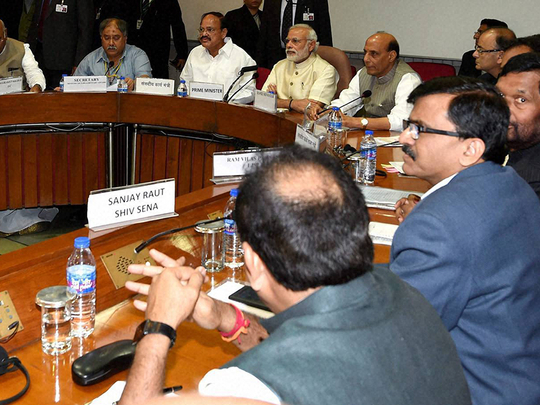
New Delhi: The NDA government on Sunday reached out to the opposition ahead of the budget session, with Parliamentary Affairs Minister M Venkaiah Naidu meeting Congress president Sonia Gandhi over its agenda, which includes the contentious ordinance on land acquisition.
The government agenda for the session beginning Monday includes 44 items of financial, legislative and non-legislative business.
Naidu met Sonia in the morning and later met leaders of opposition parties over lunch to seek their cooperation, but they all conveyed their concern on the land ordinance. Although the government has not spoken of making changes in it so far, there now appears to be a rethink on the issue.
Home Minister Rajnath Singh, who on Saturday met some farmers’ representatives on the issue, was told by them that the government had brought forth the measure without proper consultations, said sources. The representatives also asked him to ensure that their views are taken into account before bringing the bill replacing the ordinance in parliament.
The Bharatiya Janata Party (BJP) is apparently concerned about activist Anna Hazare’s protest against the ordinance and any perception of the party being viewed as anti-farmer. Congress vice-president Rahul Gandhi is also expected to lead a protest on the issue.
Naidu told Sonia that the land ordinance was brought after consultations with various states and stakeholders, but she said that her party had its concerns.
Meanwhile, Prime Minister Narendra Modi, who was present at the all-party meeting, said it was the collective responsibility of all parties to run the house.
After the meeting, Naidu told reporters that it was “very successful”.
“The general view expressed was that parliament should function smoothly. [The] focus should be on financial matters since this is the budget session,” he said.
Naidu said there was broad consensus on “four-five ordinances” of the six that need to be replaced by bills in the first half of the session ending March 20, but the opposition parties raised objections to the one on land acquisition and the government conveyed its willingness to address any issue.
Congress leader Ghulam Nabi Azad said the party will support the government on bills and ordinances, which benefit the common man, but not those which are “anti-people”.
The opposition parties are expected to raise a number of issues including attacks on churches, ceasefire violations by Pakistan and concerns of Tamil fishermen.
Lok Sabha Speaker Sumitra Mahajan has also called a meeting of leaders of parties in the house to ensure its smooth functioning.
The session will begin with President Pranab Mukherjee’s address to members of both houses of parliament.
The financial business (11 items) include presentation of and discussion on general and railway budget, voting on demands for grants, supplementary demands for grants for 2014-15 and excess demands, if any, for 2013-14.
The rail budget will be presented on February 26, Economic Survey on February 27 and general budget February 28.
While 10 new bills are slated to be introduced, the agenda includes passing of three bills pending in the Lok Sabha and seven in the Rajya Sabha. Those pending in the Lok Sabha include the Constitution (122nd Amendment) bill relating to introduction of goods and services tax, and the Lokpal and Lok Ayukta bill.
Bills pending in the Rajya Sabha include four bills already passed by the Lok Sabha including the Companies Bill, and amendments to the Public Premises Eviction of Unauthorised Occupants Act, and the Regional Rural Banks Act.
Other pending bills include a bill amending the Prevention of Corruption Act.
The new bills pertain to the National Cooperative Development Corporation, the Warehousing Corporation, Andhra Pradesh’s reorganisation, arbitration and conciliation, repeal of appropriation acts, registration of births and deaths, whistle-blowers protection, Indian Institutes of Management, National Academic Depository and Identification of Scheduled Castes.
The second part of budget session will commence on April 20 and conclude on May 8.












